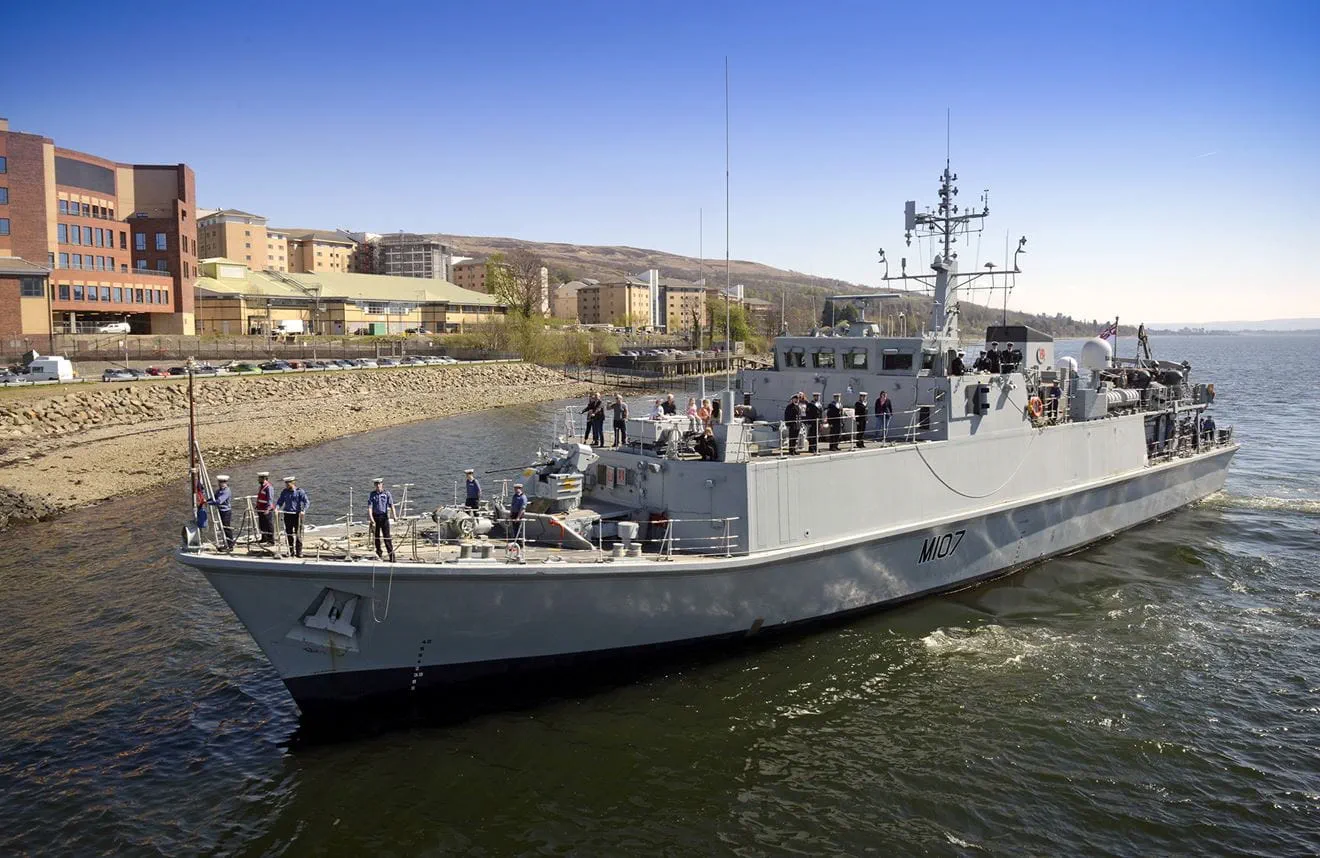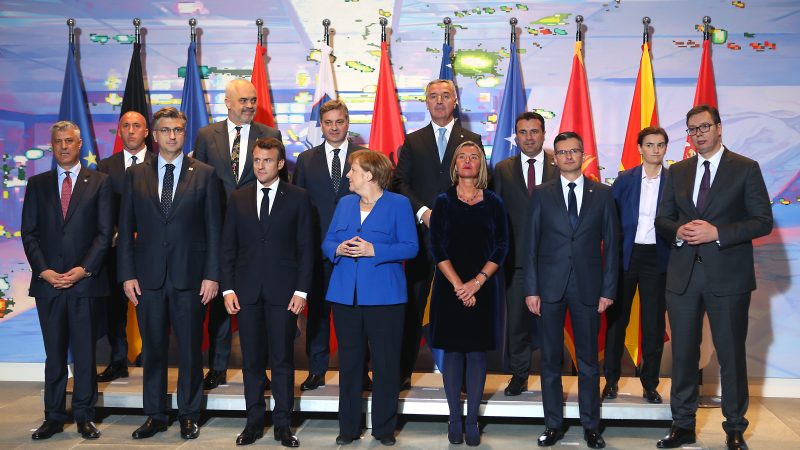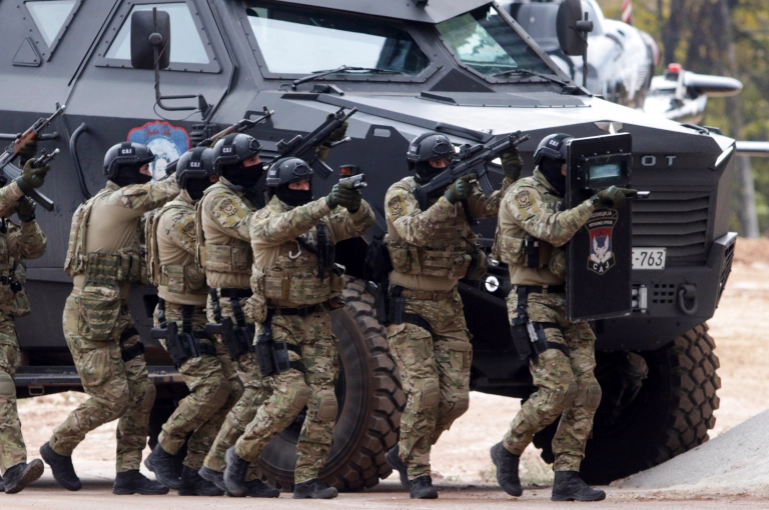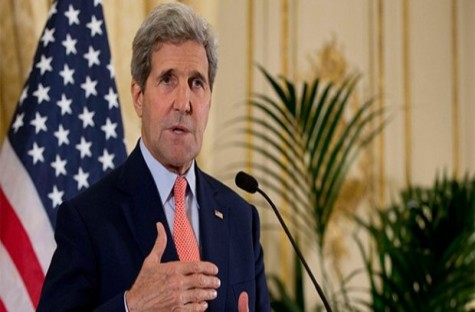
1. Türkiye’s Strategic Role in the Black Sea: A Geopolitical Analysis
In an era dominated by complex geopolitical dynamics, the situation involving Türkiye, the United Kingdom, and Ukraine offers a critical insight into the interplay of international treaties and strategic maritime operations. This section focuses on Türkiye’s implementation of the 1936 Montreux Convention amidst the ongoing Russia-Ukraine conflict. We will explore the strategic rationale behind Türkiye’s decision to deny passage to UK minehunter ships through the Turkish Straits underscoring the country's adherence to international law and its efforts to maintain regional stability.
2. Brief Reminder on the Montreux Convention
The Convention bears the formal title of "Convention Regarding The Regime Of The Straits. Signed At Montreux, July 20th, 1936."[1] The Convention in its preambular paragraph, inter alia, states the following
“Desiring to regulate transit and navigation in the Straits of the Dardanelles, the Sea of Marmora and the Bosphorus comprised under the general term ‘Straits’ in such manner as to safeguard, within the framework of Turkish security and of the security, in the Black Sea, of the riparian States, the principle enshrined in Article 23 of the Treaty 3 of Peace signed at Lausanne on the 24th July, 1923 ;
Have resolved to replace by the present Convention the Convention 4 signed at Lausanne on the 24t th July, 1923, and have appointed as their Plenipotentiaries:
The parties to the Convention are Bulgaria, France, the Great Britain, Australia, Greece, Japan, Romania, Soviet Union, (former) Yugoslavia, and Türkiye. Japan withdrew from the Convention in accordance with Article 8 of the Peace Treaty with Japan of 8 September 1951.[2]
3. Geopolitical Context and Türkiye’s Position
The United Kingdom's endeavor to send two minehunter ships to Ukraine during the Russia-Ukraine conflict provides a vital context for understanding Türkiye’s application of the the Montreux Convention. Türkiye's refusal to allow these ships' passage through the Turkish Straits stems from a deep commitment to this long-standing international treaty.
Türkiye’s Stance on the Montreux Convention: The Montreux Convention, as noted above, effective since 1936, plays a crucial role in controlling naval passage through the Turkish Straits, particularly during times of conflict. Türkiye’s adherence to this convention in the current situation is a demonstration of its commitment to international law and the maintenance of regional stability. Turkish Defense Ministry officials have firmly refuted allegations of permitting the UK's minehunter ships to enter Ukrainian waters via the Bosphorus, underscoring their dedication to the Convention's stipulations[3].
Türkiye’s Characterization of the Conflict and Neutrality: Moving from Türkiye’s stance on the convention itself, we see a broader strategic approach in play. Türkiye’s response to the conflict in Ukraine has been characterized by a swift recognition of the situation as a war and the implementation of corresponding measures. By applying the Montreux Convention to restrict the movement of military ships of conflicting parties, Türkiye aims to maintain a neutral position in the conflict, rejecting any actions that could be perceived as favoring one side over the other.
Clear Communication in Diplomatic Arenas: This strategy of neutrality extends into how Türkiye communicates its decisions on the international stage. Allegations that surfaced in media about the possible transit of UK-donated minehunters through the the Straits were quickly addressed by Türkiye's Communications Directorate. The official statement clarified Türkiye's position to its allies, emphasizing that the passage of these minehunter ships would not be permitted as long as the conflict in Ukraine continues. This stance not only reflects Türkiye’s commitment to the Montreux Convention but also its desire to communicate transparently with international partners about its decisions [4].
4. International Perspectives on Naval Passage
The debate around the UK's decision to transfer minehunters to Ukraine reveals divergent perspectives, particularly from American, British, Ukrainian, and other international viewpoints. Key figures argue that these vessels should be allowed to enter the Black Sea, despite the restrictions imposed by the Montreux Convention.
John A. Konrad V's Argument: Captain John A. Konrad V, a recognized maritime expert and entrepreneur, challenges the classification of minehunters as warships under the Montreux Convention. He contends that since the UK is not a belligerent nation in the Russia-Ukraine conflict, Türkiye cannot use the Convention to bar the passage of these ships. Konrad argues that minehunters, being naval auxiliaries, should be exempt from the restrictions applied to warships of belligerent nations[5].
Admiral James Stavridis's Viewpoint: Admiral James Stavridis, USN, Ret., former Supreme Allied Commander at NATO, asserts that Türkiye's blocking of the minehunters is a misuse of the Montreux Convention. He emphasizes the defensive nature of minehunters and their role in sustaining Ukraine's economy. Stavridis suggests that as a NATO ally, Türkiye should reconsider its decision and allow the ships to transit [6].
Ukrainian Perspective: Anton Gerashchenko, an advisor to the Minister of Internal Affairs of Ukraine, notes Türkiye’s intention to adhere to the Montreux Convention by not allowing the passage of the UK-donated minesweepers. He acknowledges the broad consensus in Türkiye on the inviolability of the Convention but suggests exploring alternative arrangements, such as transferring the ships' flags to Romania or Bulgaria, which could circumvent the Convention's restrictions without formally violating them [7].
5. The Naval Assets: Strategic Instruments in Warfare
The transfer of two Royal Navy minehunter ships to the Ukrainian Navy by the United Kingdom, as part of a broader Maritime Capability Coalition with Norway, reveals a clear strategic purpose. Despite various arguments from different countries, the primary intent of this transfer is to enhance Ukraine's capabilities in the ongoing Russian-Ukrainian war. This move is seen as an effort to overcome the restrictions imposed by the Montreux Convention which aims to maintain peace and stability in the Black Sea[8].
The UK's leadership in forming the new Maritime Capability Coalition, as confirmed by Defence Secretary Grant Shapps, underscores the strategic nature of this transfer. The coalition, involving Norway and other allies, is focused on delivering long-term support to Ukraine, including training, equipment, and infrastructure aimed at bolstering Black Sea security [9].
This initiative is not just about providing Ukraine with military assets; it is about transforming the Ukrainian Navy to make it more compatible with Western allies and NATO. The emphasis on countering the threat from Russian sea mines and restoring Ukraine's maritime exports, severely impacted by Russia's blockade in the Black Sea, highlights the strategic importance of these minehunters.
Moreover, the formation of this coalition and the transfer of minehunters are part of a broader commitment by the UK and its allies to support Ukraine militarily. This support has been significant since Russia's full-scale invasion, with a substantial amount of military aid and training provided to Ukrainian forces. The involvement of the UK and Norway, with their maritime expertise and history, further reinforces the strategic implications of this transfer for the security dynamics in the Black Sea.
6. Türkiye's Application of the Montreux Convention and Legal Considerations
In exploring Türkiye’s strict adherence to the Montreux Convention, it becomes clear that the legal classifications and provisions defining minehunters as warships are at the heart of the debate. This section will delve into these classifications, the opinions of experts in international law, and the specific stipulations of the Montreux Convention, shedding light on Türkiye’s legal rationale in this complex geopolitical scenario.
The Legal Definition of Minehunters and International Treaty Interpretation: According to the Oxford Learners' Dictionaries, a minehunter is "a military ship for finding and destroying mines." This definition categorically places minehunters within the realm of military ships, aligning with the Vienna Convention on the Law of Treaties (VCLT) Article 31, which guides treaty interpretation. This legal backing supports the classification of minehunters as warships in legal terms, providing a foundational perspective for understanding Türkiye's stance.
The Montreux Convention's Perspective on Naval Auxiliaries: Within the Montreux Convention, Article 9, which addresses naval auxiliaries, categorizes them explicitly under "Vessels of War." This classification directly challenges the notion that naval auxiliaries, such as minehunters, might not be considered warships under the Convention. It highlights the legal complexities Türkiye navigates in adhering to international treaties[10].
Detailed Definitions within the Montreux Convention: Further dissecting the Montreux Convention, Article 8 refers to Annex II for definitions and specifications of vessels of war. Here, 'auxiliary vessels' are categorized as a type of vessel of war, reinforcing the broader classification of minehunters as warships. This specific categorization strengthens Türkiye's legal argument for restricting the passage of these vessels[11].
Analyzing the Characteristics of UK Minehunters: An examination of the characteristics of the UK's minehunters, as detailed on the Royal Navy's official website, reveals that these vessels do not have features excluding them from being classified as auxiliary vessels under the Montreux Convention. The absence of exclusionary characteristics, as outlined in Annex II Section B (6) of the Convention, further aligns these minehunters with the definition of warships, aligning with the Convention's provisions and Türkiye's interpretation[12].
7. Ukraine's Overlooked Dependence on International Law
The current debate surrounding the application of the Montreux Convention in the context of the UK-Ukraine naval transfer highlights a critical aspect of Ukraine's reliance on international law, particularly their previous invocation of the same Convention. This section examines Ukraine's past actions and statements regarding the Montreux Convention, underscoring a seeming inconsistency in their stance.
In February 2022, following Russia's invasion, Ukraine's Ambassador to Ankara, Vasyl Bodnar, requested Türkiye to close its straits to Russian vessels. Bodnar's appeal for the enforcement of the Montreux Convention against Russian ships was clear: “We conveyed our official request to the Turkish side regarding the closure of the airspace, the Dardanelles [Strait] and Bosphorus [Strait] for Russian ships” [13]. This request was grounded in the Convention's provisions, which allow Türkiye to regulate the passage of warships, particularly during times of war.
Bodnar's call for sanctions against Russian businessmen and the formation of a coalition against Russian President Vladimir Putin further emphasized Ukraine's urgent need for international support and adherence to international laws and conventions in the face of aggression. This plea highlighted the perceived importance of the Montreux Convention as a tool for countering Russian military movements and securing Ukraine's position.
However, the situation has evolved since then. Ukraine's current stance regarding the UK's attempt to transfer minehunters to Ukraine, and their reaction to Türkiye’s adherence to the Montreux Convention, seems to contrast with their earlier position. Previously advocating for the strict application of the Convention against Russia, Ukraine now appears to advocate for a more flexible interpretation that would allow the passage of British minehunters [14].
Türkiye's response to Ukraine's initial request in 2022 to close the straits to Russian vessels was in line with the Convention’s provisions. Türkiye has shown a consistent approach to the application of the Montreux Convention, having previously respected its terms against Russia, as reported by Reuters (2022) and further validated by Euronews' "News Fact" segment (2023) [15].
This historical context and Ukraine's past reliance on the Montreux Convention bring to light the complexities of international law and its application. It underscores how countries may seek to leverage international treaties like the Montreux Convention to their advantage in different situations, highlighting the need for consistent and impartial application of international law.
In conclusion, Ukraine's previous invocation of the Montreux Convention in 2022 serves as an important backdrop to the current situation. It demonstrates the significance of the Convention in regional geopolitics and the importance of its consistent application. Türkiye’s adherence to the Convention, in both instances, reflects a commitment to maintaining regional stability and upholding international law, irrespective of the parties involved. This consistency is crucial for the integrity of international agreements and for fostering trust in international relations.
8. The Potential for Escalation in the Black Sea in 2024
Recent developments suggest that some Western countries are exploring avenues to circumvent the Montreux Convention, a move that could further complicate the geopolitical landscape of the Black Sea region. This pursuit, coupled with the evolving focus of the Three Seas Initiative (3SI), raises significant concerns about the potential destabilization of this strategically important area.
The Montreux Convention, which regulates the passage of naval vessels through the Turkish Straits, has long been a cornerstone of Black Sea stability. Efforts by some Western countries to find alternatives to this longstanding legal framework hint at a strategic intent to bypass the constraints imposed by the Convention. Such maneuvers not only challenge the legal order established by the Montreux Convention but also risk escalating tensions in an already volatile region.
In this context, the role of the 3SI, originally established to enhance cooperation in energy, transport, and digital infrastructure in Central and Eastern Europe, becomes increasingly pertinent. Initially articulated in the Dubrovnik Joint Statement of 2016, the 3SI aimed to foster economic development and security across the Adriatic, Baltic, and Black Sea regions ("The Three Seas Initiative," AVIM, 2016). However, the shift in its agenda post-2016, particularly in response to Russia's offensive against Ukraine, has steered the Initiative into a more politically charged direction.
The growing alignment of the 3SI with political and military support for Ukraine represents a significant departure from its original economic and infrastructural objectives. This change in focus has effectively transformed the Initiative into an active participant in the Black Sea's geopolitical tensions, potentially contributing to the destabilization of the region. The predominant composition of NATO member states within the 3SI further complicates this situation, as it may be perceived as an extension of NATO's influence in the Black Sea, heightening regional tensions.
Moreover, infrastructural developments such as Romania's construction of a new highway to the Ukrainian border, aiming to establish alternative transport corridors to Romanian ports, reflect a strategic dimension that goes beyond mere economic development.[16]These projects, while beneficial in terms of infrastructure, also carry geopolitical implications that could alter the balance of power in the Black Sea.
9. Comprehensive Evaluation of the Montreux Convention's Application
In the wake of the UK's decision to transfer minehunter ships to Ukraine, Türkiye's role as the guardian of the Turkish Straits under the Montreux Convention has been thrust into the spotlight. This section enriches our understanding of Türkiye's strategic positioning and the broader implications of the Convention's application.
Türkiye's Central Role in Preserving Black Sea Stability
Türkiye's enforcement of the Montreux Convention, particularly Articles 20 and 21, underscores its pivotal role in maintaining regional balance in the Black Sea. This enforcement extends beyond mere regulation of physical movement; it encompasses an assessment of the intentions behind naval deployments, resonating with the critical role of maritime intentions observed during the Black Sea Raid of World War I.
Interpreting the UK's Transfer Intentions
The UK's intent to transfer minehunters to Ukraine, as declared in official statements (UK Government, 2024), reveals a significant aspect of international relations. The Convention considers the rights of ships based on their flag states (Articles 8 and 9 for Black Sea states, Article 20 for non-Black Sea states). However, the underlying intent behind such transfers, potentially seen as an escalation in the Ukraine conflict, becomes a critical factor in Türkiye’s decision-making process under the Montreux framework.
This situation echoes historical precedents from World War I, where maritime intentions played a crucial role in geopolitical dynamics. In the current scenario, while the ownership of the ships (whether under British, Bulgarian, Romanian, or Ukrainian flags) is a significant legal factor under the Convention, the overall intent behind their deployment may carry greater importance. If perceived as contributing to regional instability or conflict escalation, this intent must be carefully considered within the scope of Türkiye’s role as a stabilizing force in the Black Sea.
Legal and Historical Precedents in Decision Making
Türkiye’s decision to grant or deny passage to these ships, in alignment with legal and historical precedents, transcends mere legal formalities like flag state and tonnage. It encompasses a broader assessment of potential impacts on regional stability, based on the perceived intentions behind the naval deployment. This decision reflects a complex balance between legal obligations and geopolitical prudence.
Mechanisms for Regulating Passage
Under the Montreux Convention, Türkiye has the right to regulate the passage of warships through the Straits, particularly based on Articles 20 and 21. If the ships remain under the British flag and are perceived by Türkiye as a threat to Black Sea security or peace, their passage can be legitimately restricted. Conversely, if these ships were under Bulgarian or Romanian flags, Türkiye’s ability to block passage would be limited, as both are Black Sea states (Article 8). In such cases, Türkiye can only restrict passage if the ships violate the Convention's terms.
Delaying Ship Passage
Türkiye can delay the passage of ships through the Straits based on Articles 8 and 21 of the Montreux Convention. If the ships are under Bulgarian or Romanian flags and comply with the Convention's terms, Türkiye's direct blocking power is limited (Article 8). However, Türkiye can implement regulations related to security and environmental standards, requiring scrutiny of the ships' technical capabilities and compliance with international standards (Articles 22 and 23). Additionally, Türkiye's authority to regulate maritime traffic (Article 14) can affect the ships' passage processes, potentially including additional inspections or procedures.
10. Conclusion: Türkiye’s Role as a Custodian of Regional Stability
In conclusion, Türkiye’s handling of the UK's attempt to transfer minehunter ships to Ukraine amidst the Russia-Ukraine conflict exemplifies the country's pivotal role in enforcing the Montreux Convention. By adhering firmly to this convention, Türkiye has demonstrated a strong commitment to international law and the maintenance of stability in the Black Sea region. Its decision to restrict the passage of these naval assets, balancing international pressures and legal obligations, highlights Türkiye's role as a responsible actor in complex international affairs.
Türkiye's actions, characterized by a consistent and neutral application of the Montreux Convention, underline the importance of impartiality in international law. This approach contributes to a stable geopolitical environment in the Black Sea and enhances Türkiye's credibility on the global stage. Through this case study, Türkiye emerges not only as a key player in regional geopolitics but also as an example of how nations can navigate international treaties to uphold peace and stability in strategically significant regions.
*Photograph: Royal Navy
[1] League of Nations-Treaty Series 1936. Volume CLXXHI - 1936-1937 – No 4001-4032. No: 4015, pp. 213-241. Available at https://treaties.un.org/doc/Publication/UNTS/LON/Volume%20173/v173.pdf
[2] Teoman Ertuğrul Tulun. "The Montreux Convention: A Regional And Global Safety Valve". Center for Eurasian Studies (AVİM) Report March 2020 No: 17, p. 7.
[3] “Türkiye Denies Minehunter Ships Entering Ukraine via Bosphorus,” Hürriyet Daily News, January 4, 2024, sec. Diplomacy, https://www.hurriyetdailynews.com/turkiye-denies-minehunter-ships-entering-ukraine-via-bosphorus-189358 ; Soraya Ebrahimi, “Turkey Blocks Passage of British Minehunter Ships Heading to Ukraine,” The National, January 2, 2024, sec. Europe, https://www.thenationalnews.com/world/europe/2024/01/02/turkey-blocks-passage-of-british-minehunter-ships-heading-to-ukraine/.
[4] Dezenformasyonla Mücadele Merkezi [@dmmiletisim], “Bazı basın yayın organlarında yer alan, ‘Birleşik Krallık tarafından Ukrayna’ya hibe edilen mayın avlama gemilerinin Türk Boğazlarından Karadeniz’e geçişlerine izin verildi’ iddiası doğru değildir. Türkiye, Rusya’nın Ukrayna’ya yönelik özel askeri operasyonunu derhal ‘savaş’… https://t.co/I2NIBa1dOp,” Tweet, Twitter, January 2, 2024, https://twitter.com/dmmiletisim/status/1742152318366163297.
[5] John Ʌ Konrad V, “John Ʌ Konrad V | LinkedIn,” Social Media Page, LinkedIn, 2024, https://www.linkedin.com/in/gcaptain/ ; John Ʌ Konrad V [@johnkonrad], “Well I Found My First False Community Notes. The Montreaux Convention Has Several Articles. The Only Article Activated Was Article 19 That Prevents Only Warships from BELLIGERENT Nations from Entering. Russia and Ukraine Are the Only Belligerents and Minehunters Are Naval… Https://T.Co/m3t3BxmcOA,” Tweet, Twitter, January 6, 2024, https://twitter.com/johnkonrad/status/1743621787416490418.
[6] Admiral James Stavridis, “Admiral James Stavridis, USN, Ret. on X: ‘Turkey Blocking Royal Navy Minehunters Is a Misuse of the Montreaux Convention. Minehunters Are Entirely Defensive. Their Use Allows Ukraine to Keep Its Economy Alive. As a NATO Ally, Turkey Should Reverse Course Here and Allow These Ships to Transit. Https://T.Co/fTuD2qKO0Q’ / X,” Social Media Page, X (Formerly Twitter), January 3, 2024, https://twitter.com/stavridisj/status/1742616882715238449.
[7] Anton Gerashchenko [@Gerashchenko_en], “Anton Gerashchenko Twitter Profile,” Tweet, Twitter, 2024, https://twitter.com/Gerashchenko_en; Anton Gerashchenko [@Gerashchenko_en], “Turkey Has Announced Its Intention to Ban Two Minesweepers That the United Kingdom Is Handing over to Ukraine from Transiting Its Waters on Their Way to the Black Sea, - Reuters Reported with Reference to a Statement by the Turkish Presidential Communications Directorate.… https://T.Co/AztKDUQLsv,” Tweet, Twitter, January 6, 2024, https://twitter.com/Gerashchenko_en/status/1743591968788169099.
[8] Ebrahimi, “Turkey Blocks Passage of British Minehunter Ships Heading to Ukraine.”
[9] The Rt Hon Grant Shapps MP and Ministry of Defence a, “British Minehunting Ships to Bolster Ukrainian Navy as UK and Norway Launch Maritime Support Initiative” (UK Government, December 11, 2023), https://www.gov.uk/government/news/british-minehunting-ships-to-bolster-ukrainian-navy-as-uk-and-norway-launch-maritime-support-initiative.
[10] Teoman Ertuğrul Tulun, The Montreux Convention: A Regional And Global Safety Valve, Report Series of Center for Eurasian Studies 17 (Ankara: Terazi Publishing and Center for Eurasian Studies, 2020).
[11] Tulun.
[12] Royal Navy, “Sandown-Class Minehunters” (Royal Navy, 2024), https://www.royalnavy.mod.uk/equipment/ships/sandown-class ; “Hunt-Class Mine Countermeasure Vessels” (Royal Navy, 2024), https://www.royalnavy.mod.uk/equipment/ships/hunt-class.
[13] “Ukraine Asks Turkey to Close Black Sea Straits to Russian Vessels: Envoy,” Hürriyet Daily News, February 24, 2022, sec. Diplomacy, https://www.hurriyetdailynews.com/ukraine-asks-turkey-to-close-black-sea-straits-to-russian-vessels-envoy-171766.
[14] John Konrad, “Turkey Blocks UK Minehunters From Black Sea,” Captain, January 2, 2024, https://gcaptain.com/turkey-blocks-uk-navy-from-clearing-black-sea-mines/.
[15] Sophia Khatsenkova, “Fact-Check: Is the Turkish Navy Blocking Russian Ships from Crossing the Bosphorus Strait?,” Euronews, November 3, 2023, sec. The Cube, https://www.euronews.com/my-europe/2023/11/03/fact-check-is-the-turkish-navy-blocking-russian-ships-from-crossing-the-bosphorus-strait ; Tuvan Gumrukcu, Jonathan Spicer, and Jonathan Spicer, “Russian Warships Curb Tilts Turkey to West, Risks Russia’s Ire,” Reuters, February 28, 2022, sec. World, https://www.reuters.com/world/russian-warships-curb-tilts-turkey-west-risks-russias-ire-2022-02-28/ ; Tuvan Gumrukcu, “Turkey Urges Respect for Black Sea Straits Pact after Closing Access,” Reuters, March 1, 2022, sec. Middle East, https://www.reuters.com/world/middle-east/turkey-urges-respect-black-sea-straits-pact-after-closing-access-2022-03-01/.
[16] Clash Report [@clashreport], “Romania Is Building a New Highway to the Border with Ukraine, Which Will Create a New Transport Corridor. The Goal Is to Provide Access from Ukraine to Romanian Ports, Bypassing Poland, Hungary and Slovakia. Romanian Media Reports That around 3,000 Workers and Hundreds Of… https://T.Co/4iZydRLdgo,” Tweet, Twitter, January 7, 2024, https://twitter.com/clashreport/status/1743934467603890178.
© 2009-2025 Center for Eurasian Studies (AVİM) All Rights Reserved
No comments yet.
-
 MUNICH SECURITY CONFERENCE 2020 REVEALS THE NECESSITY OF "CONSTRUCTIVE EURASIANISM"
MUNICH SECURITY CONFERENCE 2020 REVEALS THE NECESSITY OF "CONSTRUCTIVE EURASIANISM"
Teoman Ertuğrul TULUN 21.02.2020 -
 LEGACY OF "KRISENMANAGERIN": MERKEL AND THE BALKANS
LEGACY OF "KRISENMANAGERIN": MERKEL AND THE BALKANS
Teoman Ertuğrul TULUN 11.10.2021 -
 MAPPING THE CENTRAL ASIA-BLACK SEA AXIS: STRATEGIC IMPERATIVES AMIDST NEW GEOPOLITICAL AND ECONOMIC REALITIES
MAPPING THE CENTRAL ASIA-BLACK SEA AXIS: STRATEGIC IMPERATIVES AMIDST NEW GEOPOLITICAL AND ECONOMIC REALITIES
Teoman Ertuğrul TULUN 08.05.2025 -
 EUROPEAN PARLIAMENT’S UNCONSTRUCTIVE APPROACH TOWARDS TURKEY
EUROPEAN PARLIAMENT’S UNCONSTRUCTIVE APPROACH TOWARDS TURKEY
Teoman Ertuğrul TULUN 20.03.2019 -
 BOSNIA AND HERZEGOVINA FACES THE EXISTENTIAL THREAT OF SEPARATISM
BOSNIA AND HERZEGOVINA FACES THE EXISTENTIAL THREAT OF SEPARATISM
Teoman Ertuğrul TULUN 09.11.2021
-
 FROM A MISNOMER TO MISDESIGN: POSSIBLE EU CUL-DE-SAC IN BALKANS
FROM A MISNOMER TO MISDESIGN: POSSIBLE EU CUL-DE-SAC IN BALKANS
Teoman Ertuğrul TULUN 13.03.2018 -
 NO PAROLE FOR THE ASSASSIN OF TURKISH DIPLOMAT
NO PAROLE FOR THE ASSASSIN OF TURKISH DIPLOMAT
Hazel ÇAĞAN ELBİR 02.06.2020 -
 BOOK REVIEW: AZERBAIJAN DIARY: A ROGUE REPORTER'S ADVENTURES IN AN OIL-RICH, WAR-TORN, POST-SOVIET REPUBLIC
BOOK REVIEW: AZERBAIJAN DIARY: A ROGUE REPORTER'S ADVENTURES IN AN OIL-RICH, WAR-TORN, POST-SOVIET REPUBLIC
Nigar SHİRALİZADE 20.07.2018 -
 US SECRETARY OF STATE JOHN KERRY’S VISIT TO FIVE CENTRAL ASIAN COUNTRIES
US SECRETARY OF STATE JOHN KERRY’S VISIT TO FIVE CENTRAL ASIAN COUNTRIES
Hazel ÇAĞAN ELBİR 10.11.2015 -
 TURKIYE-CHINA RELATIONS: OPPORTUNITIES AND CHALLENGES
TURKIYE-CHINA RELATIONS: OPPORTUNITIES AND CHALLENGES
Seyda Nur OSMANLI 22.11.2024
-
25.01.2016
THE ARMENIAN QUESTION - BASIC KNOWLEDGE AND DOCUMENTATION -
12.06.2024
THE TRUTH WILL OUT -
27.03.2023
RADİKAL ERMENİ UNSURLARCA GERÇEKLEŞTİRİLEN MEZALİMLER VE VANDALİZM -
17.03.2023
PATRIOTISM PERVERTED -
23.02.2023
MEN ARE LIKE THAT -
03.02.2023
BAKÜ-TİFLİS-CEYHAN BORU HATTININ YAŞANAN TARİHİ -
16.12.2022
INTERNATIONAL SCHOLARS ON THE EVENTS OF 1915 -
07.12.2022
FAKE PHOTOS AND THE ARMENIAN PROPAGANDA -
07.12.2022
ERMENİ PROPAGANDASI VE SAHTE RESİMLER -
01.01.2022
A Letter From Japan - Strategically Mum: The Silence of the Armenians -
01.01.2022
Japonya'dan Bir Mektup - Stratejik Suskunluk: Ermenilerin Sessizliği -
03.06.2020
Anastas Mikoyan: Confessions of an Armenian Bolshevik -
08.04.2020
Sovyet Sonrası Ukrayna’da Devlet, Toplum ve Siyaset - Değişen Dinamikler, Dönüşen Kimlikler -
12.06.2018
Ermeni Sorunuyla İlgili İngiliz Belgeleri (1912-1923) - British Documents on Armenian Question (1912-1923) -
02.12.2016
Turkish-Russian Academics: A Historical Study on the Caucasus -
01.07.2016
Gürcistan'daki Müslüman Topluluklar: Azınlık Hakları, Kimlik, Siyaset -
10.03.2016
Armenian Diaspora: Diaspora, State and the Imagination of the Republic of Armenia -
24.01.2016
ERMENİ SORUNU - TEMEL BİLGİ VE BELGELER (2. BASKI)
-
AVİM Conference Hall 24.01.2023
CONFERENCE TITLED “HUNGARY’S PERSPECTIVES ON THE TURKIC WORLD"









